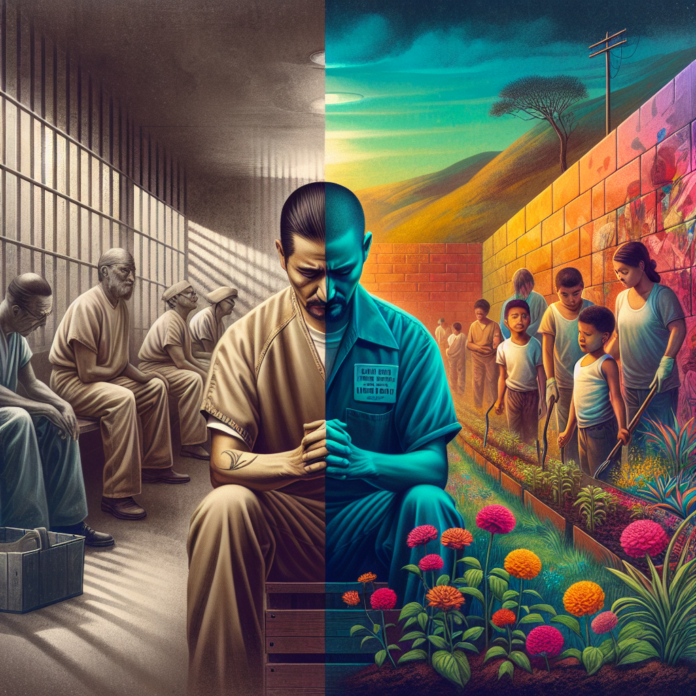In the heart of the justice system’s intricate maze lies a saga that has captured the attention of the public and legal experts alike for decades—the case of the Menendez brothers. Once condemned to life without the possibility of parole, their plight has reignited discussions around rehabilitation and redemption within the confines of prison walls. With recent developments and a compelling narrative of personal transformation, the spotlight turns once again to a pair of siblings who, amidst a backdrop of heinous crimes and alleged molestation, have embarked on a remarkable journey towards rehabilitation. The blog delves into the nuances of this high-profile case, exploring the societal implications of their possible resentencing, and the broader question of whether true rehabilitation can pave the way for a second chance in life.
The Menendez Brothers: A Case Study
The Menendez brothers, Lyle and Erik, have spent decades in prison for the brutal murders of their parents. Their case is an emblematic example of the complexities embedded in criminal justice, blending elements of heinous crime, familial dysfunction, and the potential for redemption. Recent developments have put their case back into the public eye, with renewed discussions on whether life sentences without parole should transform into opportunities for rehabilitation.
The Legal Process and Resentencing Considerations
Resentencing is a legal proceeding that examines if the original sentence is still just, given the individual’s present circumstances. In the Menendez brothers’ case, this involves assessing their behaviors and contributions while incarcerated, effectively determining if their debt to society is deemed paid.
The conversation pivots on two focal points:
- Rehabilitation: Over the years, the brothers have engaged in activities that reflect an inclination towards self-betterment and aiding others. From pursuing education to organizing groups for address trauma and supporting inmates with disabilities, they have walked a path of apparent redemption.
- Public Safety: A core question remains whether these individuals can safely reenter society. With statistical analyses indicating low reoffending rates among those granted parole under similar circumstances, there is an argument that supports their capability to lead lives outside prison walls.
The Broader Implications of the Case
This case delves deeper than the fate of two individuals. It is a reflection of societal attitudes towards sexual abuse victims and the often-dismissed narratives surrounding them. The Menendez brothers claimed their actions were a result of long-standing abuse by their father, a claim that highlights the pervasive issue of disbelieving victims, especially male victims.
Challenge of Cultural Biases
The justice system must grapple with inherent biases that have historically marginalized victims of sexual assault. The brothers’ first trial resulted in a hung jury, reflecting society’s mixed feelings and biases towards their allegations of abuse. The second trial, however, culminated in a conviction, emphasizing the need to address these implicit biases.
A Call for Support and Understanding
Understanding the cultural and psychological aftermath of abuse is critical. The public’s often sensationalized portrayal of high-profile trials can overshadow the core issues, yet it also provides a platform to catalyze change. The Menendez case serves as a poignant reminder that justice must be administered with empathy, especially towards those who have suffered silently.
Victims of sexual abuse are encouraged to seek help without fear of disbelief or disregard. Support systems within LA County and beyond stand ready to assist survivors, fostering an environment where justice aligns with compassion and understanding.
Final Steps and Future Outlook
The legal journey continues as the decision for resentencing awaits judicial approval. The court’s final ruling will determine if the Menendez brothers’ transformation is acknowledged legally, potentially turning life without parole into life with a chance of parole.
A favorable decision by the court would permit the brothers’ cases to be reviewed by a parole board, which would ultimately decide their fate. Yet, dissent remains within the very office pursuing resentencing, underscoring the controversy that shadows their potential release.
Conclusion: A Journey Towards Redemption
The Menendez brothers’ case is a narrative of crime, punishment, and the potential for genuine rehabilitation. It challenges the justice system to weigh not just the crimes committed but the person who exists beyond the crime.
Their story serves as a critical examination of the broader justice system’s role in recognizing rehabilitation as an achievable goal. It invites us to question whether society believes in second chances and how justice can reconcile with the possibility of redemption. As this case unfolds, it may redefine the boundaries of clemency, empathy, and justice for future generations.




